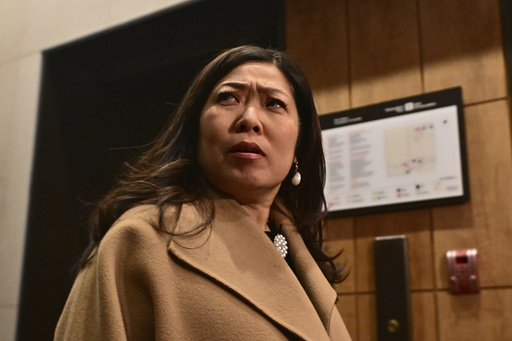
TORONTO — Canadian Prime Minister Justin Trudeau confronted a significant challenge in his political career following the resignation of Finance Minister Chrystia Freeland from the Cabinet on Monday. Freeland, who has been a crucial ally and widely regarded as one of Trudeau’s most trusted ministers, stepping down has sent shockwaves through the political landscape, particularly as Trudeau’s popularity has been waning amid concerns over inflation and immigration. The Prime Minister, who has held office for nearly a decade, must navigate these turbulent waters while his government also prepares for an incoming U.S. administration led by Donald Trump.
Trump took to social media to comment on Freeland’s departure, expressing his disbelief at the situation. He described Freeland’s behavior as “toxic,” suggesting that her approach was unhelpful for Canada’s citizens. Trump has a history of critiquing Trudeau and has previously suggested that Freeland was unpopular during trade negotiations. In response to Freeland’s resignation, Trudeau quickly appointed Dominic LeBlanc, a long-time friend and ally, as her successor. LeBlanc had recently dined with Trump at Mar-a-Lago, a visit Freeland did not attend.
After being sworn in, LeBlanc emphasized the government’s commitment to addressing the cost of living for Canadians and finding collaborative strategies with Trump concerning economic and border security issues. Trudeau later addressed his party members and recognized the challenging nature of the day, referring to it as one of the “toughest days” for his administration, though he did not lay out his next steps.
Calls for Trudeau’s resignation have intensified, particularly from Jagmeet Singh, the leader of the opposition New Democratic Party (NDP), who insisted that Trudeau should step down. Meanwhile, the main opposition, the Conservative Party, has not explicitly demanded his resignation but is urging for elections to be held. Despite this pressure, an immediate vote of no confidence does not seem imminent, as Parliament is set to adjourn for the holiday season.
In her resignation letter, Freeland indicated that Trudeau had informed her just days earlier that he no longer wished for her to continue in her finance minister role, later offering her a different position within the Cabinet. However, she concluded that leaving was the only “honest and viable path” forward as Trudeau and Freeland had increasingly divergent views on addressing the country’s economic challenges.
Freeland specifically opposed recent government proposals, including a two-month sales tax holiday and direct payments to Canadians, arguing that such measures could be deemed “costly political gimmicks” given the looming threats of tariffs from Trump. She emphasized the importance of maintaining fiscal discipline in light of potential economic challenges. In her resignation, Freeland admitted that the country faces grave challenges requiring a focus on sustainable financial strategies.
Despite being offered a position to oversee Canada-U.S. relations, which lacked substantive authority, Freeland declined, highlighting her significant role in past negotiations. This development left many wondering how Trudeau’s government would handle the fallout from Trump’s threats of imposing extensive tariffs unless Canada tightened its border control measures.
Trudeau intends to lead the Liberal Party into the next election, despite growing dissent within his ranks. Many party members have expressed a desire for a change in leadership, and Freeland’s exit severely undermines his administration. Following a meeting with his lawmakers, it became evident that not all members stand united behind him, with some, like Chad Collins, signaling a need for new leadership direction.
Notably, Canadian history shows that no prime minister has successfully secured four consecutive terms in over a century, raising further questions about Trudeau’s political future. With a federal election required by October, the Liberals must rely on additional party support, especially as they do not possess an outright majority. Singh has indicated that all avenues are available for consideration in light of these developments.
Trudeau’s rise to power in 2015 was bolstered by invoking the legacy of his father, the late Prime Minister Pierre Trudeau, and reestablishing Canada’s liberal identity after a prolonged Conservative rule. However, the public’s sentiment has shifted significantly, with rising living costs and a surge in immigration following the pandemic raising concerns. Trudeau’s leadership has included progressive policies, such as increasing immigration and cannabis legalization, while Freeland reflected in her resignation letter on the importance of focussing on the well-being of Canadians rather than the internal challenges of governance.
Amid these political upheavals, Trudeau has sought to recruit Mark Carney, a prominent figure with prior leadership at the Bank of Canada and the Bank of England, to join his government, a move that seems less likely now following LeBlanc’s appointment as finance minister. Political analysts interpret Freeland’s resignation as a significant development, suggesting that this might push the NDP to reconsider its relationships within Parliament during these times of uncertainty, as Trudeau’s government finds itself facing potentially insurmountable challenges.

